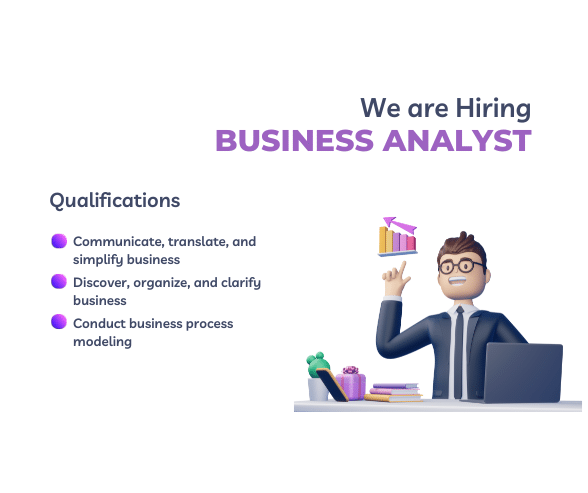It’s a good time to become a business process analyst, as it is an ever-growing career path that helps businesses optimize their workflow. Having a person skilled in finding flaws in the core company processes is an invaluable tool for improving the business and staying ahead of the competition.
Business process analysis has been a rapidly growing field over the past decade, and in this article, we will discuss what it means to be a business process analyst and give you information on how to get started in this exciting field.
What is a Business Process Analyst?
A business process analyst is responsible for designing, documenting, and implementing business processes. These professionals also evaluate and improve existing business processes and train new employees; their responsibilities range from systems analysis to software development.
As a business process analyst, you can bring effective and long-lasting changes to your company. Many things get overlooked, either because the company has to focus on its main goal, doesn’t have enough time, or lacks a skilled workforce that can evaluate processes within the company from a different perspective.
Business analysts work in all industries, including banking, insurance, healthcare, and government agencies. No matter what your job as a business analyst requires, your key task will be to recognize problems and find solutions to your company’s problems.
With ongoing digitalization, companies need business process analysts more than ever. A professional who has a good understanding of business workflows, different processes, and software is a valuable asset to the team.
A solid understanding of process management and some IT expertise is a must for success in this position. You’ll have to take care of application and software difficulties, identify any obstacles, and find a process-driven solution.
Your main goal as a business process analyst is to minimize unexpected downtime, stop productivity losses, and utilize IT spending.
Business Process Analyst Job Responsibilities
As a business process analyst, you will be responsible for analyzing and improving the efficiency of existing business processes. As part of this role, you may also design new processes or train employees on them, as you are the catalyst for change in the company you work for.
These are some of the responsibilities business process analysts can expect to have:
- Evaluating employee’s work
- Assessing internal procedures
- Thinking about employee’s needs
- Managing business analysis
- Dealing with process reengineering projects
- Working with the IT department
- Developing new process designs
- Interpreting complex data for key stakeholders
- Keeping records of your business process modeling efforts
- Simplify processes that take away time from core tasks
Qualifications of a Business Process Analyst
To get started, you’ll need to learn about the job and what it entails. The more you know about your future career, you will be better prepared for interviews and evaluations.
You should also create an action plan that will help you get there. When making this plan, consider what skills you need and if you need to take some extra classes on the topic.
The best way to decide if you have the qualifications for a business process analyst is to look at your experience. If you haven’t worked in one of these positions before, search for internships or training so that when an opportunity comes up, you’ll be ready!
Let’s take a look at what sort of knowledge base you should have when considering a career as a business process analyst.
Business process knowledge
Naturally, the most essential knowledge you should have is the ability to understand the business process as a whole, which includes all aspects of the organization, including customers, suppliers, and employees.
You will be included in gathering data about every person and process within the organization. It’s a key factor to know what you’re dealing with and what role each person or software has within the company.
Once you are familiar with how the organization works, you’ll be able to recognize what companies might use to propel their businesses.
Data analysis knowledge
Data analysis is the process of examining data to identify patterns and trends or to answer specific questions. It can be used in business to make decisions grounded in hard-cold data you gather over time. You will be involved in processes ranging from recruiting new people to project documentation.
You have to be able to analyze data from multiple sources, such as surveys or interviews with employees or customers. It will help you identify patterns or trends within your organization’s processes that may lead you toward making improvements later on.
Data software knowledge
Data software knowledge is essential for streamlining processes. Knowing the right software for streamlining workflow is crucial, as the right one will yield exact reports, and you’ll be able to manage many things more easily.
Automation software knowledge is also a big plus, as process automation frees up time and resources, thus contributing to the overall efficiency of the business.
Design software knowledge
Knowing how to handle certain design software will allow you to present the information in a visually appealing way, which is important for communicating complex solutions and issues regarding business processes.
Business Process Analyst Skills
To become an analyst, you will need to acquire certain business process analyst certifications as well as possess the fundamental skills needed to succeed in this career.
Let’s explore the fundamental skills an analyst should have.
Technical Skills
Business process analysts have to be able to assess available software and apps to see how they could automate business and improve current business strategy. This is a crucial part of the company’s IT strategy and internal development. With many cloud-based workflow apps, there needs to be someone who will recognize the right one for their company.
Cloud-based business process apps will be a big part of your strategy, and you’ll have to collaborate with top performers in the team to decide on an IT solution that will fit their standards, finances, and long-term objectives. Having sound technical skills and process management knowledge will help your company’s goals in the long run.
Analytics Skills
Every problem a company encounters has several potential answers. It will be up to you to decide which one is the best.
Business process analysts have to define the issue and develop strategies using analytical thinking. You will need to do in-depth research before making any major decisions and keep an eye on developments in various sectors.
New tools and methods for process mapping will continually improve, and so will your experience and knowledge. With more knowledge and experience, you will be able to deduce what works and what should be given a different approach. Maybe you’ll have to discard a strategy completely. It’s all part of the process.
Communication Skills
An important part of your core skill set will be negotiation and listening to people. If you don’t like how this sounds, then reconsider becoming a business process analyst.
Without good communication skills, you won’t be able to do your job well. Your role requires you to interact with people from various professional backgrounds. You will come across entirely opposite perspectives within one team, and you’ll need to learn how to make it work.
Interdepartmental collaboration is a fundamental part of the analyst profession, and it’s critical to develop interpersonal skills and practice active listening before you even consider taking a job.
Research Skills
While active listening is also part of research skills, you will have to do market research and analyze the competition to develop a good strategy for your business. You will have to analyze new and existing business strategies, observe how the market operates, and implement any necessary changes to your company’s workflow.
Career Path of a Business Process Analyst
Becoming a business process analyst is a great career choice, especially if you’re interested in improving the way companies work.
It’s a very rewarding path if the idea of being responsible for making sure all aspects of an organization’s business operate smoothly and efficiently is something you find inspiring.
But before even thinking of embarking on this career path, you need to make sure you have strong analytical abilities to identify areas where improvements can be made. Creativity is also a big plus since you’ll have to come up with innovative solutions when necessary, and this will probably happen often.
Lastly, if you have excellent communication skills that allow you to explain your ideas clearly to upper management, you’re the right person for the job.
Business Process Analyst Salary
According to Payscale, the average business process analyst salary is around $70,000 in the United States. Keep in mind that it can range from $50,000 to $120,000, though.
If you are based in New York City or Boston, you can expect to earn around $90,000 per year. The highest-paying states for this role are most likely California ($96k), Texas ($94k), and Florida ($91k). However, your paycheck will greatly vary depending on your skill set.
Business process management and business process improvement skills are in high demand, so you can expect a paycheck above average if you’re good with process management.
Consider taking additional courses in data science or software if you want to stand out among candidates when you’re applying for an internship or a job!
Business Process Analyst Outlook
As business processes continue to evolve and become more complex, the demand for business process analysts will remain strong. Business process analysts will need to adapt their skill sets to meet the changing needs of their employers and clients.
As technology continues its rapid development pace, many businesses are adopting new technologies such as artificial intelligence (AI) and machine learning. These technologies have already had an impact on how some companies operate.
However, they haven’t yet been widely adopted across all industries globally. This is because they need extensive training before workers can use them effectively at scale within organizations’ operation teams. This is where the role of a business process analyst will be important.
Conclusion
If you’re interested in becoming a business process analyst, this is a great time to start your career. The field is growing, and there are many opportunities for new aspiring professionals.
We hope this article will be a first step on this career path if you decide it’s the right thing for you. Your job will be challenging but rewarding—and it pays well too!








